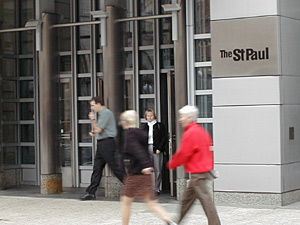|
Audio
Photos
More from MPR
Resources
Your Voice
|
Job impact of St. Paul Companies merger remains cloudy
November 19, 2003
 |
| Workers leave the downtown St. Paul headquarters of The St. Paul Companies after the proposed merger with Travelers was announced on Monday. (MPR Photo/Jeff Horwich) |
St. Paul, Minn. — The meeting was open to the St. Paul Companies' 2,700 employees in St. Paul, and carried by webcast to another 7,000 in field offices. Employees leaving the company's downtown headquarters said there was little in the meeting they hadn't read or heard in the press. Most were reluctant to talk or share their names.
One man said Fishman advised them to be wary of what they see in the papers, specifically speculation about layoffs and a front-page headline that claimed The St. Paul is acquiring Travelers. The two companies are calling the arrangement a "merger of equals," and neither company's shareholders will receive a premium in the deal.
One woman, who works in insurance underwriting, left the meeting in a good mood.
"I think it's a wonderful thing, it's a great thing," she said. "It's two companies merging together who do insurance well. It's going to be large, going to be powerful."
|
The first question (employees) have is, 'What does this mean for me?'
- Joan Palm, spokeswoman for The St. Paul Companies |
She says employees did have questions in the meeting, but none had an angry or upset tone.
Another employee, who gave her name as Julie, says Fishman didn't comment one way or another about job cuts. But employees understand consolidating two companies could mean layoffs.
"It doesn't imply that it's around the corner, but it's something for the long-term," she said. She said Fishman told them nothing has been decided about what employees or divisions might be moving or eliminated.
Joan Palm, spokeswoman for The St. Paul, says the company has not made those decisions yet. "The first question (employees) have is, 'What does this mean for me?'" she said. "We won't be able to answer the question, 'What does this mean to me?' for individual employees, but we can provide them a context and an understanding of how long these decisions will take and what they will mean over time."
Palm says the timeline for determining the new company's structure is "months, not weeks. I expect some integration and many decisions related to the individual business units will actually occur after the merger is completed," in the second quarter of 2004, she said.
Currently a few important facts are known about the new company, called St. Paul Travelers. The corporate headquarters will be in St. Paul, as will the specialized insurance business. Sales of general business insurance will be based at the former Travelers headquarters in Hartford, Connecticut.
The St. Paul has shown an increasing interest in general insurance since acquiring the company USF&G in 1998, and professor Peter Young wonders if that might be a long-term trend. Young teaches about the insurance industry at the University of St. Thomas School of Business.
He talked after the merger announcement with a few of his students who are employees of The St. Paul. The students' sense, and Young's, is that a lot depends on whether the new company's emphasis continues to shift to general business insurance.
"I don't think (the students) looked at this in the sense that, 'Oh, my job is immediately in peril,'" Young said. "The uncertainty for them is simply, over the long run, does St. Paul sustain its interest in specialty markets?"
If it doesn't, that could mean a drawing down in St. Paul. But Young takes the fact that the new company's headquarters will remain here as a sign they will retain a significant presence for some time to come. He also says if labor cost-cutting were a major purpose of the merger, we would probably be hearing about layoffs already. We're not.
But the combined company does intend to save $415 million over the next three years. Insurance companies don't have a lot of assets to cut -- aside from their people. Company officials say at this point what people, when, and where is all a matter of pure guesswork.
(The St. Paul Companies is an underwriter of programming on Minnesota Public Radio)
|
News Headlines
|
Related Subjects
|
